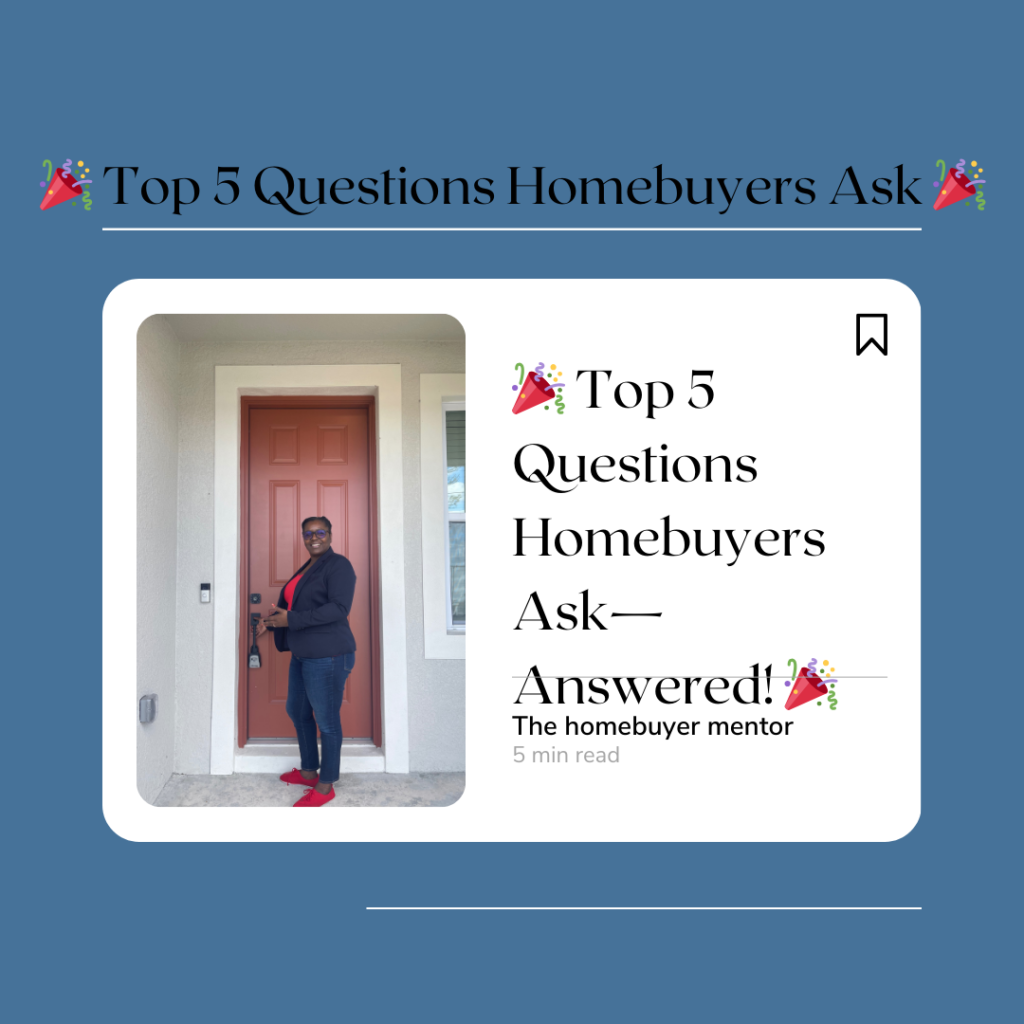
Buying your first home is an exciting journey, but it can come with plenty of questions. As The Homebuyer Mentor, I specialize in helping renters transition into homeowners in Tampa, FL. 🏡 Whether you’re new to the process or just need some guidance, here are the top five questions I get from homebuyers—and the answers you need to move forward with confidence!
How Much Do I Need for a Down Payment?
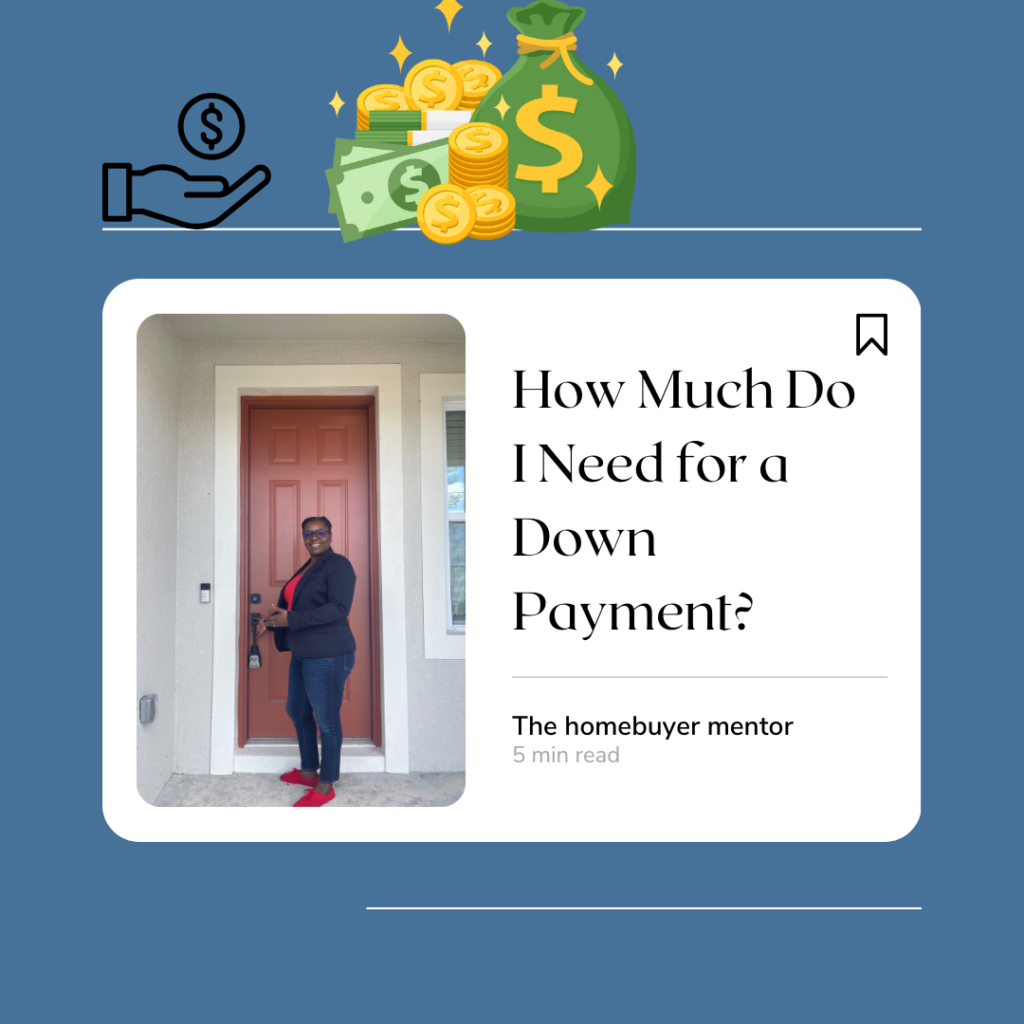
1. How Much Do I Need for a Down Payment?
One of the biggest misconceptions about buying a home is that you need a 20% down payment. While having 20% down can help you avoid private mortgage insurance (PMI) and reduce your monthly payment, it’s not a requirement for most homebuyers—especially first-time buyers!
In reality, there are several loan programs designed to make homeownership more accessible, with much lower down payment requirements:
- FHA Loans: Backed by the Federal Housing Administration, FHA loans require as little as 3.5% down. These loans are great for buyers with lower credit scores or limited savings.
- Conventional Loans: Some conventional loans offer down payment options as low as 3%, especially for first-time homebuyers.
- VA Loans: If you’re a veteran, active-duty service member, or part of a military family, VA loans often require no down payment at all and come with other great benefits like no PMI.
- USDA Loans: For buyers looking in eligible rural or suburban areas, USDA loans also offer a zero-down payment option.
What Does This Mean in Real Dollars?
Let’s break it down. If you’re buying a home in Tampa, FL, for $300,000:
- With a 3.5% down payment, you’d need $10,500.
- With a 3% down payment, you’d need $9,000.
These numbers are far more attainable than the $60,000 required for a 20% down payment!
Down Payment Assistance Programs in Tampa, FL
First-time homebuyers in Florida may also qualify for down payment assistance programs. These programs can provide grants or low-interest loans to help cover your down payment or closing costs. Some popular options include:
- Florida Housing Finance Corporation (FHFC) Programs: Offers financial assistance for down payments and closing costs.
- City of Tampa Housing Assistance: Provides various resources for low-to-moderate income buyers.
As The Homebuyer Mentor, I specialize in helping buyers navigate these programs to reduce out-of-pocket costs. 💰
Start Saving Now!
If you’re planning to buy a home, start saving as early as possible. Even small, consistent contributions can add up over time. Remember, in addition to the down payment, you’ll need funds for closing costs and an emergency fund to ensure you’re financially secure in your new home.
What Credit Score Do I Need
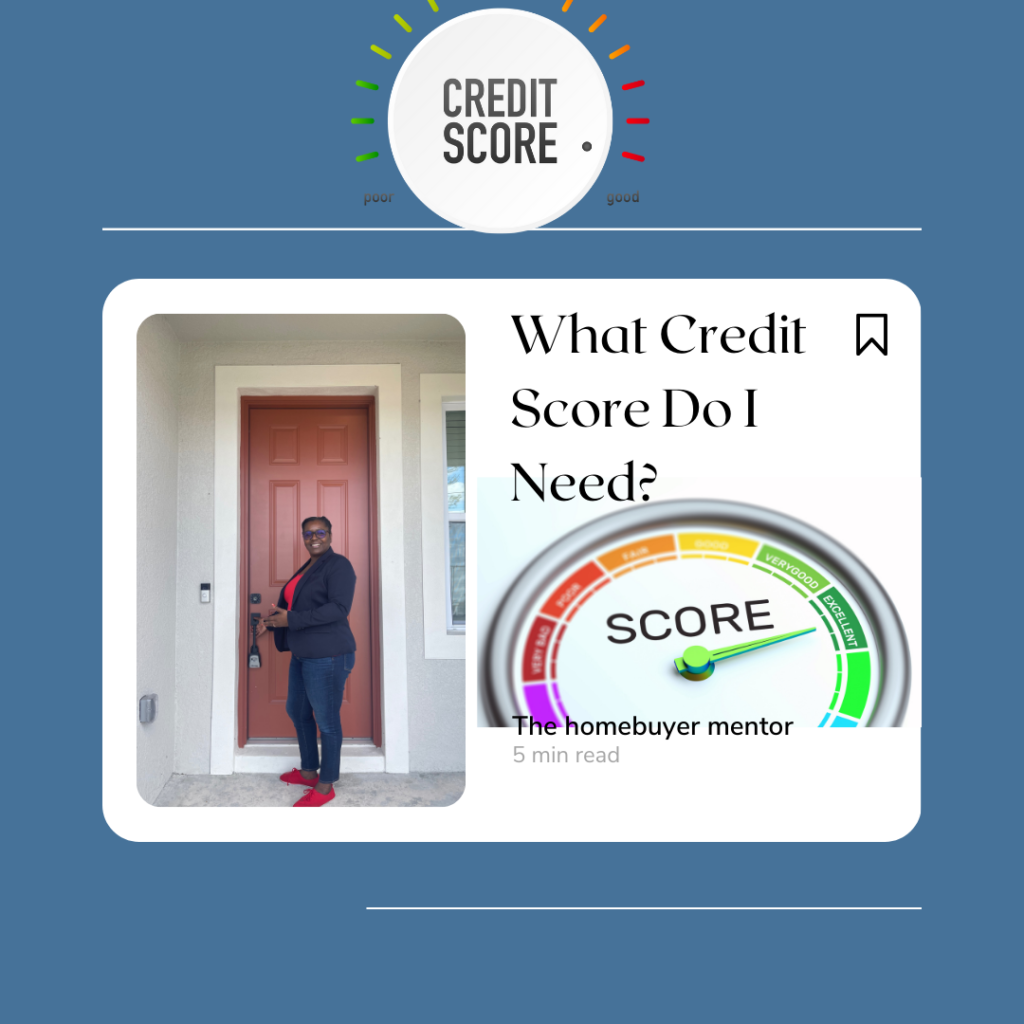
2. What Credit Score Do I Need?
Your credit score plays a significant role in the home-buying process because it reflects your financial reliability. But here’s the good news: you don’t need a perfect score to buy a home!
Many first-time homebuyers assume they need a score of 700 or higher, but plenty of loan programs are designed to accommodate buyers with moderate or even low credit scores. Let’s break it down:
Minimum Credit Score Requirements by Loan Type
- FHA Loans: These government-backed loans are one of the most popular options for first-time buyers. FHA loans require a minimum credit score of 580 to qualify for a 3.5% down payment. If your score is between 500-579, you may still qualify, but you’ll need to put down at least 10%.
- Conventional Loans: These loans typically require a credit score of 620 or higher. However, buyers with higher credit scores often receive better interest rates, which can save you money over the life of the loan.
- VA Loans: For veterans and active-duty military members, VA loans don’t set a strict minimum credit score. Most lenders, however, look for a score of at least 580-620.
- USDA Loans: These loans, aimed at buyers in rural or suburban areas, generally require a credit score of 640 or higher.
Why Your Credit Score Matters
Your credit score impacts two key aspects of the home-buying process:
- Loan Approval: Lenders use your score to assess the risk of lending to you. A higher score shows you’re more likely to repay your mortgage.
- Interest Rates: Higher credit scores typically qualify for lower interest rates, which can save you thousands of dollars over the life of your loan. For example, improving your credit score from 620 to 700 could lower your monthly payment significantly.
What If My Credit Score Needs Work?
If your credit score isn’t where it needs to be, don’t worry—there are ways to improve it before you apply for a mortgage:
- Pay Down Debt: Lowering your credit utilization rate can boost your score quickly.
- Make Payments on Time: Consistently paying your bills by the due date is one of the most effective ways to build credit.
- Check for Errors: Review your credit report for mistakes that might be dragging down your score. Dispute any inaccuracies you find.
- Avoid Opening New Credit Accounts: Each new account can lower your score temporarily, so it’s best to avoid new credit inquiries before applying for a mortgage.
No Credit? No Problem!
If you don’t have an established credit history, you might still qualify for certain loan programs. Some lenders will consider non-traditional credit factors, like rent payments, utility bills, or other consistent payments, to assess your eligibility.
Work with a Trusted Expert
As The Homebuyer Mentor, I can connect you with experienced lenders who specialize in helping first-time buyers navigate the credit requirements. We’ll create a personalized plan to get you mortgage-ready, even if your score isn’t perfect yet.
How Do I Get Pre-Approved?
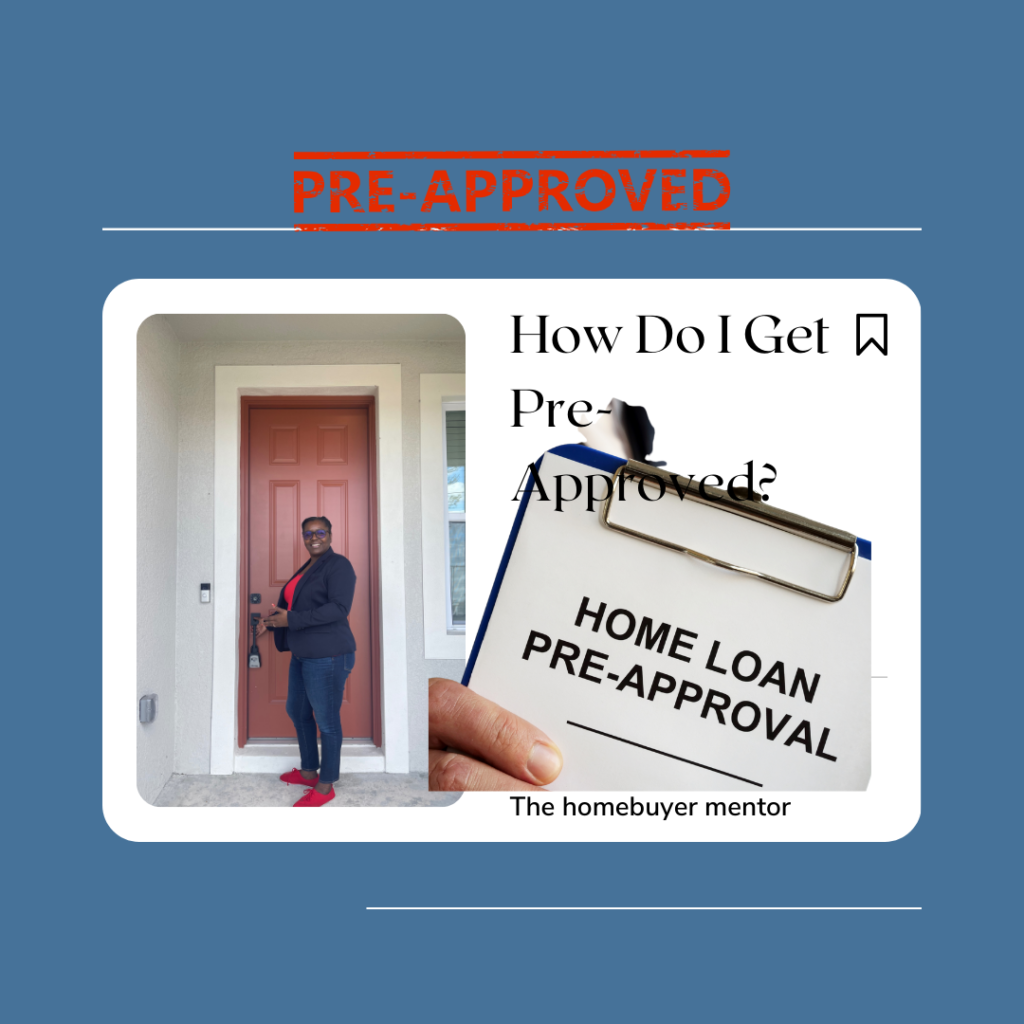
3. How Do I Get Pre-Approved?
Getting pre-approved for a mortgage is one of the most important steps in the home-buying process. It not only shows you how much house you can afford but also signals to sellers that you’re a serious buyer. Let’s break it down step by step.
What Is a Pre-Approval?
A pre-approval is a letter from a lender stating how much money they are willing to lend you based on your financial profile. This amount is determined after reviewing your income, credit history, debts, and assets.
Unlike a pre-qualification, which is a quick estimate, a pre-approval is more detailed and carries more weight when making an offer on a home. Sellers often prefer buyers with a pre-approval letter because it reduces the risk of the deal falling through due to financing.
Steps to Get Pre-Approved
1️⃣ Gather Your Documents
To start the pre-approval process, your lender will need to verify your financial information. Be prepared to provide:
- Proof of income (pay stubs, tax returns, W-2s, or 1099s)
- Bank statements for the past 2-3 months
- Details about your debts (credit cards, car loans, student loans, etc.)
- Identification (driver’s license, Social Security number)
2️⃣ Check Your Credit
Your credit score and history play a major role in determining your eligibility and interest rate. Before applying, it’s a good idea to review your credit report and address any errors or discrepancies.
3️⃣ Choose a Lender
Not all lenders are the same! Research different lenders to find the one that offers the best rates, terms, and customer service. As The Homebuyer Mentor, I can connect you with trusted lenders who work with first-time buyers in Tampa, FL.
4️⃣ Submit Your Application
Once you’ve chosen a lender, complete their mortgage application. Be honest and thorough when providing your financial information. The more accurate your application, the smoother the process will be.
5️⃣ Get Your Pre-Approval Letter
If your application is approved, the lender will issue a pre-approval letter stating the loan amount you qualify for. This letter is typically valid for 60-90 days. With this in hand, you’re ready to start shopping for your dream home!
Why Pre-Approval Matters
- Sets Your Budget: A pre-approval helps you determine how much house you can afford, so you can shop with confidence.
- Strengthens Your Offer: Sellers are more likely to accept offers from pre-approved buyers, especially in competitive markets like Tampa, FL.
- Saves Time: With your financing in place, you’ll be able to move quickly once you find the perfect home.
Pro Tip: Stay Mortgage-Ready
After you’re pre-approved, avoid making major financial changes, like opening new credit accounts, making large purchases, or changing jobs. These actions could affect your loan approval.
Ready to Get Pre-Approved?
What Can I Afford?
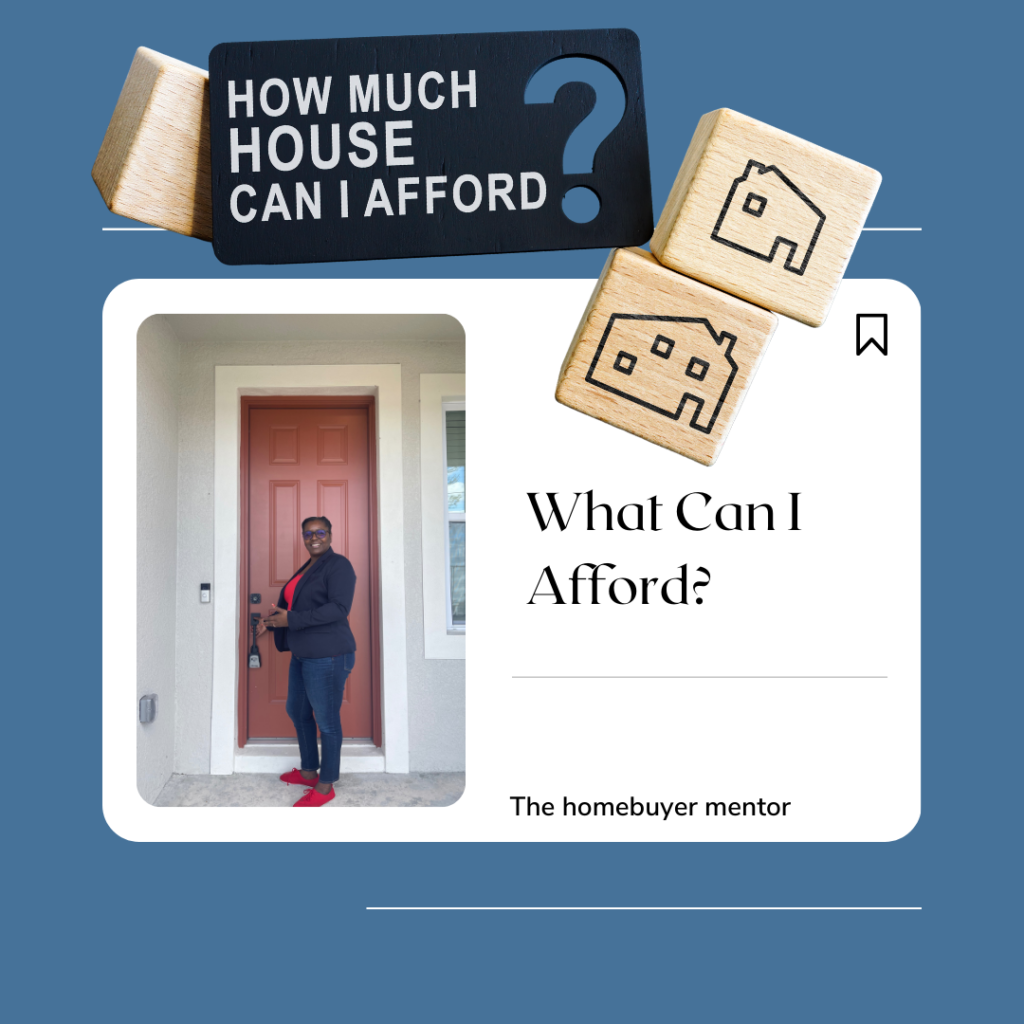
4. What Can I Afford?
One of the most critical questions every homebuyer asks is, “What can I afford?” Understanding your budget is essential for finding a home that fits your financial situation while allowing you to maintain your lifestyle comfortably. Let’s explore how to determine your home-buying budget.
Factors That Determine How Much You Can Afford
Several key factors come into play when determining your home affordability:
1️⃣ Income
Your monthly income is the foundation of your budget. Lenders look at your gross monthly income to calculate how much you can afford for a mortgage payment.
2️⃣ Debt-to-Income Ratio (DTI)
This ratio measures the percentage of your monthly income that goes toward paying debts, including credit cards, car loans, student loans, and, of course, your future mortgage.
- Front-End DTI: This is the portion of your income dedicated solely to your housing costs (mortgage, property taxes, and homeowners insurance). Lenders generally prefer this to be under 28%.
- Back-End DTI: This includes all your debts and housing costs. A good benchmark is staying below 36%, though some loan programs allow up to 43% or more.
3️⃣ Down Payment
The amount you’re able to put down affects your loan size and monthly payment. Larger down payments can reduce your loan amount, lower your monthly payment, and even help you avoid private mortgage insurance (PMI).
4️⃣ Credit Score and Interest Rates
Your credit score impacts the interest rate you qualify for. Lower interest rates mean lower monthly payments, which can increase your affordability.
5️⃣ Additional Costs
Beyond the mortgage payment, consider other homeownership expenses like:
- Property taxes
- Homeowners insurance
- HOA fees (if applicable)
- Maintenance and repairs
How to Calculate What You Can Afford
Here’s a simple guideline to estimate affordability:
- Rule of Thumb: Multiply your gross annual income by 2.5 to 3. This provides a rough estimate of how much home you can afford. For example, if you earn $75,000 annually, you might afford a home priced between $187,500 and $225,000.
- Monthly Payment Limit: Financial experts recommend that your monthly mortgage payment (including taxes and insurance) not exceed 30% of your gross monthly income.
Use a Mortgage Calculator
Online mortgage calculators can help you estimate your monthly payment based on:
- Home price
- Down payment
- Loan term (15 or 30 years)
- Interest rate
Try experimenting with different scenarios to see what fits your budget.
Let’s Make Your Budget Work for You
Finding a home within your budget doesn’t mean compromising on your dreams. As The Homebuyer Mentor, I’ll work closely with you to:
- Review your financial situation.
- Connect you with trusted lenders for pre-approval.
- Find homes in Tampa, FL, that fit your needs and budget.
My goal is to ensure that your home-buying journey is stress-free, empowering, and financially smart!

5. Do I Really Need a Realtor?
This is a common question among homebuyers, especially first-timers who might be wondering if they can navigate the home-buying process on their own. While it’s possible to buy a home without a realtor, working with a professional brings significant advantages that can save you time, money, and stress.
Here’s why having a realtor, like The Homebuyer Mentor, by your side is invaluable:
Expertise and Knowledge
Realtors are licensed professionals with in-depth knowledge of the local real estate market.
- Market Insights: A realtor knows the neighborhoods, market trends, and pricing strategies, ensuring you’re not overpaying for a home.
- Professional Network: Realtors work closely with lenders, home inspectors, appraisers, and other professionals who are crucial to the home-buying process.
Access to Listings
While online platforms like Zillow and Realtor.com are great starting points, they don’t always show the full picture. Realtors have access to the Multiple Listing Service (MLS), which offers the most accurate and up-to-date listings, including homes not yet visible to the public.
Negotiation Skills
Negotiating the best deal for your dream home can be tricky. Realtors are skilled negotiators who advocate for your best interests.
- They’ll negotiate the purchase price, repairs, closing costs, and other terms to ensure you get the best deal possible.
Guidance Through Complex Paperwork
Buying a home involves a mountain of paperwork, from purchase agreements to disclosure forms.
- A realtor ensures all forms are completed accurately and submitted on time, reducing the risk of delays or legal issues.
- Streamlined Process: Your realtor will handle scheduling showings, coordinating with sellers, and managing deadlines.
- Avoid Costly Mistakes: Without professional guidance, you could miss critical details during inspections or end up with a deal that’s not in your favor.
Cost of a Realtor
Here’s the best part for buyers: You typically don’t pay your realtor’s commission! In most cases, the seller pays the commission for both their agent and yours, so you get all the benefits of professional representation at no cost to you.
Do You Really Need a Realtor? The Answer is Yes!
A realtor is your advocate, advisor, and partner throughout the home-buying journey. As The Homebuyer Mentor, my mission is to make your experience as smooth and stress-free as possible while helping you find the perfect home in Tampa, FL.
📩 Ready to start your homeownership journey with a trusted expert? Contact me today, and let’s turn your dream into a reality!
The Homebuyer Mentor: Turning Renters To Homeowners
